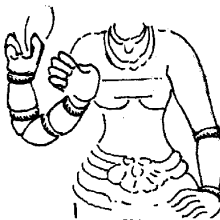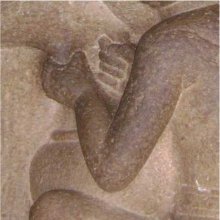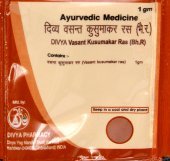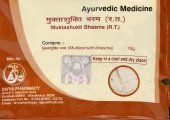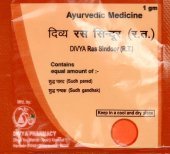Ri, Ṛ, R, Ṝ, Ṟ, Ṟi, Ṟī: 16 definitions
Introduction:
Ri means something in Hinduism, Sanskrit, Marathi, Hindi, Tamil. If you want to know the exact meaning, history, etymology or English translation of this term then check out the descriptions on this page. Add your comment or reference to a book if you want to contribute to this summary article.
The Sanskrit terms Ṛ and Ṝ can be transliterated into English as R or Ri, using the IAST transliteration scheme (?).
Images (photo gallery)
(+22 more images available)
In Hinduism
Vyakarana (Sanskrit grammar)
Source: Wikisource: A dictionary of Sanskrit grammar1) R (र्).—Second letter of the यण् (yaṇ) class (semi-vowels) which has got the properties नादभागित्व, घोषवत्त्व (nādabhāgitva, ghoṣavattva),' संवृतत्व (saṃvṛtatva) and अल्पप्राणता (alpaprāṇatā) i. e. it is a sonant, inaspirate consonant. Regarding its स्थान (sthāna) or place of production, there is a difference of opinion : generally the consonant र् (r) is looked upon as a cerebral or lingual letter (मूर्धन्य (mūrdhanya)); cf ऋटुरषाणां मूर्धा (ṛṭuraṣāṇāṃ mūrdhā), S.K.also Pan. Siksa; but it is called by some as दन्त्य (dantya) or दन्तमूलीयः (dantamūlīyaḥ) cf रेफस्तु दस्त्ये दन्तमूले वा (rephastu dastye dantamūle vā) RT. 8, by others as दन्तमूलीय (dantamūlīya) and and by still others as वर्स्त्य (varstya) gingival. In the Vajasaneyi-Pratisakhya it is described as दन्तमूलीय (dantamūlīya); cf रो दन्तमूल (ro dantamūla) I. 68, while in the Taittiriya Pratisakhya it is said to be produced by the touch of the middle part of the tip of the tongue just above the root of the teeth ; cf. रेफे जिह्वाग्रमध्येन प्रत्यग्दन्तमूलेभ्यः (rephe jihvāgramadhyena pratyagdantamūlebhyaḥ) T. Pr. II. 41;
2) R.—Substitute र् (r) (रेफ (repha)) for the final letter of the word अहन् (ahan), as also for the final of अम्रस्, ऊधस्, अवस् (amras, ūdhas, avas) and भुवस् (bhuvas) optionally with रु (ru), which (रु (ru)) is dropped before vowels, and changed to ओ (o) before अ (a) and soft consonants, while it is changed into visarga before hard consonants and surds.e.g. अम्नरेव, अम्र एवः ऊधरेव, ऊधएवः (amnareva, amra evaḥ ūdhareva, ūdhaevaḥ) cf. Kas. on P. VIII, 2-70:
3) R.—The consonants र (ra) (technically) called रु (ru) in Panini's grammar) which is substituted for the consonant स् (s) and for the consonant न् (n) of the word अहन् (ahan) when the consonant स् (s) or न् (n) stands at the end of a word. This substitute रु (ru), unlike the substitute र् (r) is liable to be changed into visarga, or the consonant य् (y), or the vowel उ (u) by P. VIII.3.15, 17, VI.1.113, 114.
4) Ṛ (ऋ).—Word-form of the ajbhakti or svarabhakti (a term used in the ancient Prātiśākhya works), where ऋ (ṛ) is looked upon as the consonant र् (r) surrounded by, or followed by the nature of a vowel. ऋ (ṛ) as a vowel is possessed of one mātrā of which in svarabhakti, the consonant र् (r) possesses half and the svarabhakti possesses half; cf रेफात् स्वरोपहिताह्यञ्जनोदयाद् ऋकारवर्णा स्वरभाक्तिरूत्तरा (rephāt svaropahitāhyañjanodayād ṛkāravarṇā svarabhāktirūttarā) R. Pr. VI.13.
5) Ṝ (ॠ).—Long variety of the vowel ऋ.

Vyakarana (व्याकरण, vyākaraṇa) refers to Sanskrit grammar and represents one of the six additional sciences (vedanga) to be studied along with the Vedas. Vyakarana concerns itself with the rules of Sanskrit grammar and linguistic analysis in order to establish the correct context of words and sentences.
Purana and Itihasa (epic history)
Source: archive.org: Puranic EncyclopediaṚ (ऋ).—This letter means "sound". (Agni Purāṇa, Chapter 348).
Source: JatLand: List of Mahabharata people and placesRi (रि) refers to the name of a Ṛṣi (sage) mentioned in the Mahābhārata (cf. ). Note: The Mahābhārata (mentioning Ri) is a Sanskrit epic poem consisting of 100,000 ślokas (metrical verses) and is over 2000 years old.

The Purana (पुराण, purāṇas) refers to Sanskrit literature preserving ancient India’s vast cultural history, including historical legends, religious ceremonies, various arts and sciences. The eighteen mahapuranas total over 400,000 shlokas (metrical couplets) and date to at least several centuries BCE.
Languages of India and abroad
Marathi-English dictionary
Source: DDSA: The Molesworth Marathi and English Dictionaryṛ (ऋ).—
--- OR ---
ṛ (ऋ).—The seventh vowel. The sound of it can be represented by no English letter, and must be acquired by the ear. R̤i is here used for it.
--- OR ---
rī (री).—f (Imit.) The second of the musical notes. 2 The word or sound upon which the mate or second of a singer dwells and rings, whilst his principal proceeds to the next line. v dē, dhara, ōḍha.
Source: DDSA: The Aryabhusan school dictionary, Marathi-Englishṛ (ऋ).—The seventh vowel.
--- OR ---
rī (री).—or
--- OR ---
rī (री).—or -
--- OR ---
rī (री).—or -
Marathi is an Indo-European language having over 70 million native speakers people in (predominantly) Maharashtra India. Marathi, like many other Indo-Aryan languages, evolved from early forms of Prakrit, which itself is a subset of Sanskrit, one of the most ancient languages of the world.
Sanskrit dictionary
Source: DDSA: The practical Sanskrit-English dictionaryṚ (ऋ).—ind. An interjection of (1) calling; (2) ridicule; (3) censure or abuse; (4) used at the beginning of a sentence.
-ṛḥ cf. ऋनि- र्ऋतिर्नलो नाकः खगराडथ वासुकिः । शालः पितृस्वसुः पुत्रोऽदितिर्दितिरुमा रमा (ṛni- rṛtirnalo nākaḥ khagarāḍatha vāsukiḥ | śālaḥ pitṛsvasuḥ putro'ditirditirumā ramā) || Ek.
--- OR ---
Ṛ (ऋ).—I. 1 P. [ऋच्छति, आर, आर्षीत्, अरिष्यति, ऋत (ṛcchati, āra, ārṣīt, ariṣyati, ṛta); caus. अर्पयति (arpayati); desid. अरिरिषति (aririṣati); अरार्यते (arāryate) reduplicative (atyarthamṛcchati) cf. किमभीरुररार्यसे (kimabhīrurarāryase) Bhaṭṭikāvya 4.21.]
1) To go, move; अम्भच्छा- यामच्छामृच्छति (ambhacchā- yāmacchāmṛcchati) Śiśupālavadha 4.44. यथाश्मानमृत्वा लोष्ठो विध्वंसेत (yathāśmānamṛtvā loṣṭho vidhvaṃseta) Bṛ. Up.1.3.7.
2) To rise, tend towards. -II. 3 P. (iyarti, ārat, ṛta Mostly used in the Veda.)
1) To go.
2) To move, shake.
3) To obtain, gain, acquire, reach, meet with.
4) To move, excite, raise (as voice, words &c.) वाचमियर्ति (vācamiyarti).
5) To display. -III. 5 P. (ṛṇoti, ṛṇa)
1) To injure, hurt.
2) To attack. -Caus. (arpayati, ārpipat, arpita)
1) To throw, cast, fling; fix or implant in; हृदि शल्यमर्पितम् (hṛdi śalyamarpitam) R.8.87.
2) To put or place on, fix upon, direct or cast towards (as the eye &c.); वामत्रकोष्ठार्पितहेमवेत्रः (vāmatrakoṣṭhārpitahemavetraḥ) Kumārasambhava 3.41; Ś.6.5,17,3.26; R.17. 79; Ś.6.8; Bhaṭṭikāvya 5.9; Kumārasambhava 6.11; R.15.77; Bhagavadgītā (Bombay) 8.7, 12.14; करपल्लवार्पित (karapallavārpita) Śiśupālavadha 9.54.
3) To place in, insert, give, set or place; अपथे पदमर्पयन्ति हि (apathe padamarpayanti hi) R.9.74,78; चित्रार्पिताम् (citrārpitām) Ś.6.15 drawn in a picture; R.2.31; द्वारदेशे (dvāradeśe) Amaru. 62; V.4.35; Mu.7.6; Bhartṛhari 3.18; लोकोत्तरं चरितमर्पयति प्रतिष्ठाम् (lokottaraṃ caritamarpayati pratiṣṭhām) R. G.
4) To hand or make over; give to, give in charge of, consign, deliver; इति सूतस्याभरणान्यर्पयति (iti sūtasyābharaṇānyarpayati) Ś.1,4. 19; Bhaṭṭikāvya 8.118; Y.2.65.
5) To give up, sacrifice (as the inherent sense); अत्र कलिङ्गगङ्गाशब्दौ आत्मानमर्पयतः (atra kaliṅgagaṅgāśabdau ātmānamarpayataḥ) S. D.2.
6) To give back, restore; अर्पितप्रकृतिकान्तिभिर्मुखैः (arpitaprakṛtikāntibhirmukhaiḥ) R.19.1; Bhaṭṭikāvya 15.16; Amaruśataka 94; Manusmṛti 8.191; Y.2. 169.
7) To pierce through, perforate, penetrate.
--- OR ---
Ṝ (ॠ).—ind. An interjection of (1) terror; (2) warding off; (3) reproach or censure; (4) compassion; (5) remembrance; (6) Commencement of speech; (7) protection; (8) pride; (9) looking up. -m.
--- OR ---
Ṝ (ॠ).—
1) Name of Bhairava.
2) A Dānava or demon. -f.
1) The mother of the gods; also of the demons.
2) Recollection.
3) Motion, going. -n. The breast. (cf. also ṛrniṣedho bhavaḥ pūṣā varuṇo'mararāḍajaḥ | karī tarurnaraḥ pāpmā vidvānatha ramāpatiḥ || Enm.)
Derivable forms: ṝḥ (ॠः).
--- OR ---
Ṝ (ॠ).—9 P. (ṝṇāti, īrṇa) To go, move. रुणवर्णः स्यात्क्लीबः पापी पराजितः । वीतरागोऽथ पाखण्डी कमलं मरणं च लृ (ruṇavarṇaḥ syātklībaḥ pāpī parājitaḥ | vītarāgo'tha pākhaṇḍī kamalaṃ maraṇaṃ ca lṛ) || Enm.
--- OR ---
Ri (रि).—(for ṛṣabha) The second note of the Indian Gamut.
--- OR ---
Ri (रि).—I. 6 P. (riyati, rīṇa) To go, move. -II. 5 P. (riṇoti) To hurt. -III. 9 U. (riṇāti-te)
1) To drive out, expel.
2) Ved. To separate.
3) To emit.
4) To give, grant.
5) To go, move.
6) To hurt.
--- OR ---
Rī (री).—I. 4 Ā. (rīyate) To trickle, drip, distil, ooze, flow. -II. 9 U. (riṇāti, riṇīte, rīṇa; caus. repayati-te)
1) To go, move.
2) To hurt, injure, kill.
3) To howl.
Source: Cologne Digital Sanskrit Dictionaries: Shabda-Sagara Sanskrit-English DictionaryṚ (ऋ).—The seventh vowel of the Sanskrit alphabet, and peculiar to it. It corresponds in sound with Ri, in merrily.
--- OR ---
Ṛ (ऋ).—f. (ā) A name of Aditi, the mother of the gods. ind. 1. An expression of abuse. 2. An articulate sound. 3. An expression of laughter. 4. A sound inarticulate or reiterated as in stammering.
--- OR ---
Ṛ (ऋ).—r. 1st cl. (ṛcchati) 1. To go, to approach. 2. To gain, to acquire; (the radical is changed to ṛcha before an initial mute śa.) r. 3rd cl. (īyartti) To go; (some confine this root to the Vedas.) r. 5th cl. (ṛṇoti) To kill, to injure; also ri.
--- OR ---
Ṝ (ॠ).—The long vowel corresponding to the short one preceding, and having the sound of Ri long.
--- OR ---
Ṝ (ॠ).—r. 9th cl. (gi) (ṝṇoti) To go or move.
--- OR ---
Ṝ (ॠ).—f. (rī) 1. The mother of the gods. 2. Also of the demons. 3. Recollection. m. (ā) 1. A name of Bhairava. 2. An Asura or demon. 3. The breast. 4. Motion, going. ind. 1. Incipient particle. 2. An interjection of compassion. 3. Of reproach. 4. Of terror. 5. A mystical letter used in the Tantras. ḷ
--- OR ---
Ri (रि).—r. 5th cl. (riṇoti) To hurt or injure. r. 6th cl. (riyati) To go, to move.
--- OR ---
Ri (रि).—m.
(-riḥ) 1. The tone of voice by which the note Rishabha is uttered. 2. Dancing, tumbling. 3. Waste, loss. f.
(-riḥ) 1. Wish, desire. 2. Light, lustre. E. rā to give, aff. ki .
--- OR ---
Rī (री).—r. 9th cl. (riṇāti) 1. To hurt, to injure. 2. To go, to move. 3. To howl, as a wild beast. (ṅ) rīṅ r. 4th cl. (rīyate) 1. To distil, to ooze, to drop. 2. To fall, to alight. r. 2nd cl. (reti) To bear or conceive, (as a child.)
Source: Cologne Digital Sanskrit Dictionaries: Benfey Sanskrit-English DictionaryṚ (ऋ).—i. 1, ṛccha (in epic poetry also arccha = ), ii. 3; 5; 9 [Parasmaipada.] 1. To go. 2. To go to. 3. To undergo. With abstracts (cf. i): [Mānavadharmaśāstra] 1, 53, glānim ṛcchati, To become inert; Mahābhārata 3, 2166, mṛtyum, To die; arch, [Nala] 7, 4; Mahābhārata 3, 84; [Nalodya, (ed. Benary.)] 2, 10, yuddharaṅgatām āra, To become the field of battle. 4. To rise, ṛ-ṇu. 5. To meet, [Mānavadharmaśāstra] 8, 351; to attain, [Nalodya, (ed. Benary.)] 1, 32; to fall on, [Mānavadharmaśāstra] 8, 18, ṛccha. 6. To gain, to acquire. 7. To move, to raise, ved. ii. 3, iyarmi. 8. To open, ii. 5. 9. To attack, Mahābhārata 4, 1059, ṛccha. 10. To hurt; ṛta, and ṛte, see separately.
— [Causal.] arpaya, 1. To cast; arpita, thrown, Ragh, 8, 87; turned, [Bhagavadgītā, (ed. Schlegel.)] 8, 7. 2. To fasten, [Śākuntala, (ed. Böhtlingk.)] [distich] 133. 3. To pierce. 4. To put, [Raghuvaṃśa, (ed. Stenzler.)] 9, 74. 5. To deliver, [Yājñavalkya, (ed. Stenzler.)] 2, 65; [Daśakumāracarita] in
— arpita. 1. Cut in, [Śākuntala, (ed. Böhtlingk.)] [distich] 74. 2. Written, [Raghuvaṃśa, (ed. Stenzler.)] 17, 79.
--- OR ---
Ṝ (ॠ).—Ṛ10, ii. 5, To go (cf. ṛ and īr).
--- OR ---
Ri (रि).—i. 6, riya, [Parasmaipada.] To go.
--- OR ---
Ri (रि).—ii. 5, v. r. for ṛ, ii. 5, To hurt.
--- OR ---
Rī (री).—ii. 9, riṇā, riṇī. [Parasmaipada.] 1. To go. 2. To howl. 3. To hart.
--- OR ---
Rī (री).—i. 4, [Ātmanepada.] To distil, to ooze, to drop.
— With the prep. anu anu, To drop after, to follow dropping,
— Cf. [Gothic.] and [Anglo-Saxon.] rinnan (based on ii. 5).
Source: Cologne Digital Sanskrit Dictionaries: Cappeller Sanskrit-English DictionaryṚ (ऋ).—iyarti ṛṇoti ṛṇute ṛṇvati ṛcchati ṛcchate arcchati arti pp ṛta (q.v.) move (tr.), raise, excite; move ([intransitive]), rise, hasten, meet with, get at, reach, attain. [Causative] arpayati hurl, throw, pierce, send, put, place, fasten or fix in, turn, direct (eyes or mind); offer, deliver, give back, restore.
--- OR ---
Ri (रि).—rī, riṇāti, riṇīte, rīyate, [participle] rīṇa A. let loose, sever from ([ablative]); cause to run or stream, emit, grant, bestow; [Middle] flow, run, dissolve.
--- OR ---
Rī (री).—v. ri.
Source: Cologne Digital Sanskrit Dictionaries: Monier-Williams Sanskrit-English Dictionary1) Ṛ (ऋ):—1. ṛ the seventh vowel of the Sanskṛt alphabet and peculiar to it (resembling the sound of ri in merrily).
2) 2. ṛ ind. an interjection expressing laughter, [cf. Lexicographers, esp. such as amarasiṃha, halāyudha, hemacandra, etc.]
3) a particle implying abuse, [cf. Lexicographers, esp. such as amarasiṃha, halāyudha, hemacandra, etc.]
4) a sound inarticulate or reiterated as in stammering, [Horace H. Wilson]
5) 3. ṛ m. heaven, [cf. Lexicographers, esp. such as amarasiṃha, halāyudha, hemacandra, etc.]
6) f. Name of Aditi, [cf. Lexicographers, esp. such as amarasiṃha, halāyudha, hemacandra, etc.]
7) 4. ṛ [class] 1. 3. 5.[Parasmaipada] ṛcchati, iyarti, ṛṇoti, and ṛṇvati (only [Vedic or Veda]);
— āra, ariṣyati, ārat, and ārṣīt, to go, move, rise, tend upwards, [Ṛg-veda; Nirukta, by Yāska] etc.;
—to go towards, meet with, fall upon or into, reach, obtain, [Ṛg-veda; Atharva-veda; Śatapatha-brāhmaṇa; Chāndogya-upaniṣad; Mahābhārata] etc.;
—to fall to one’s share, occur, befall (with [accusative]), [Ṛg-veda; Aitareya-brāhmaṇa; Śatapatha-brāhmaṇa; Manu-smṛti] etc.;
—to advance towards a foe, attack, invade, [Śatapatha-brāhmaṇa; Mahābhārata; Manu-smṛti];
—to hurt, offend, [Śatapatha-brāhmaṇa vii];
—to move, excite, erect, raise, (iyarti vācam, he raises his voice, [Ṛg-veda ii, 42, 2]; stomān iyarmi, I sing hymns, [Ṛg-veda i, 116, 1]), [Ṛg-veda; Atharva-veda vi, 22, 3] :—[Causal] arpayati, to cause to move, throw, cast, [Atharva-veda x, 9, 1; Raghuvaṃśa] etc.;
—to cast through, pierce, [Atharva-veda];
—to put in or upon, place, insert, fix into or upon, fasten, [Ṛg-veda; Śākaṭāyana; Kumāra-sambhava; Bhagavad-gītā] etc.;
—to place on, apply, [Kathāsaritsāgara; Ratnāvalī; Raghuvaṃśa] etc.;
—to direct or turn towards, [Rāmāyaṇa; Bhagavad-gītā] etc.;
—to deliver up, surrender, offer, reach over, present, give, [Yājñavalkya; Pañcatantra; Vikramorvaśī] etc.;
—to give back, restore, [Manu-smṛti viii, 191; Yājñavalkya; Śakuntalā] etc.: [Vedic or Veda] [Intensive] alarti, [Ṛg-veda viii, 48, 8];—(2. sg. alarṣi, [Ṛg-veda viii, 1, 7; Pāṇini 7-4, 65]);
—to move or go towards with speed or zeal: Class. [Intensive] [Ātmanepada] arāryate ([Pāṇini 7-4, 30]), to wander about, haste towards, [Bhaṭṭi-kāvya; Patañjali; Kāśikā-vṛtti];
8) cf. [Greek] ὄρ-νυ-μι, ἐρ-έ-της, ἀρό-ω, etc.: Zend √ir: [Latin] or-ior, re-mus, aro: [Gothic] argan: [Anglo-Saxon] ār: Old High [German] ruo-dar, ar-an: [Lithuanian] ir-ti, ‘to row’; ar-ti, ‘to plough.’
9) Ṝ (ॠ):—1. ṝ the eighth vowel of the alphabet (the corresponding long vowel to ṛ and resembling the sound of ri in marine, but after labials more like ru; it generally only appears in some forms of nouns in ṛ, viz. in the [genitive case] [plural] of all genders, in the [accusative] [plural] m. and f. and in [nominative case] [accusative] and [vocative case] [plural] n.)
10) 2. ṝ ind. an interjection of terror, [cf. Lexicographers, esp. such as amarasiṃha, halāyudha, hemacandra, etc.]
11) a particle implying reproach
12) warding off, [cf. Lexicographers, esp. such as amarasiṃha, halāyudha, hemacandra, etc.]
13) a particle used at the beginning of a sentence, [cf. Lexicographers, esp. such as amarasiṃha, halāyudha, hemacandra, etc.]
14) 3. ṝ m. a Bhairava, [cf. Lexicographers, esp. such as amarasiṃha, halāyudha, hemacandra, etc.]
15) a Dānava, [cf. Lexicographers, esp. such as amarasiṃha, halāyudha, hemacandra, etc.]
16) f. the mother of the gods
17) of the demons, [cf. Lexicographers, esp. such as amarasiṃha, halāyudha, hemacandra, etc.]
18) recollection
19) going, motion, [cf. Lexicographers, esp. such as amarasiṃha, halāyudha, hemacandra, etc.]
20) n. a breast, [cf. Lexicographers, esp. such as amarasiṃha, halāyudha, hemacandra, etc.]
21) 4. ṝ for 4. ṛ q.v.
22) Rī (री):—[from ra] a f. going, motion, [cf. Lexicographers, esp. such as amarasiṃha, halāyudha, hemacandra, etc.]
23) Ri (रि):—1a See √1. rī.
24) 2. ri (ifc.) = rai3 (cf. ati-ri, bṛhad-ri).
25) 3. ri (for ṛṣabha), the second note of the Hindū gamut.
26) Rī (री):—1. rī or ri (cf. √li) [class] 9. [Parasmaipada] ([Dhātupāṭha xxxi, 30]) riṇāti [class] 4. [Parasmaipada] ([Dhātupāṭha xxvi, 29]) rīyate (riṇīte, [Ṛg-veda; Brāhmaṇa; Gṛhya-sūtra and śrauta-sūtra]; riyati, [Dhātupāṭha xxviii, 111]; [imperfect tense] ariṇvan, [Maitrāyaṇī-saṃhitā]; [grammar] [perfect tense] rirāya, rirye; [Aorist] araiṣīt, areṣṭa; [future] retā; reṣyati, te; [infinitive mood] retum),
—to release, set free, let go, [Ṛg-veda];
—to sever, detach from ([ablative]), [ib.];
—to yield, bestow, [Atharva-veda];
— ([Ātmanepada]) to be shattered or dissolved, melt, become fluid, drop, flow, [Ṛg-veda] :—[Causal] repayati ([Aorist] arīripat) [grammar]:—[Desiderative] rirīṣati, te, [ib.] : [Intensive] rerīyate, rerayīti, [ib.]
27) Ri (रि):—1b or rī (cf. √li) [class] 9. [Parasmaipada] ([Dhātupāṭha xxxi, 30]) riṇāti [class] 4. [Parasmaipada] ([Dhātupāṭha xxvi, 29]) rīyate (riṇīte, [Ṛg-veda; Brāhmaṇa; Gṛhya-sūtra and śrauta-sūtra]; riyati, [Dhātupāṭha xxviii, 111]; [imperfect tense] ariṇvan, [Maitrāyaṇī-saṃhitā]; [grammar] [perfect tense] rirāya, rirye; [Aorist] araiṣīt, areṣṭa; [future] retā; reṣyati, te; [infinitive mood] retum),
—to release, set free, let go, [Ṛg-veda];
—to sever, detach from ([ablative]), [ib.];
—to yield, bestow, [Atharva-veda];
— ([Ātmanepada]) to be shattered or dissolved, melt, become fluid, drop, flow, [Ṛg-veda] :—[Causal] repayati ([Aorist] arīripat) [grammar]:—[Desiderative] rirīṣati, te, [ib.] : [Intensive] rerīyate, rerayīti, [ib.]
28) Rī (री):—2. rī = rai in ṛdhad-rī q.v.
29) 3. rī f. See under 3. ra, p. 859, col. 3.
Source: Cologne Digital Sanskrit Dictionaries: Yates Sanskrit-English Dictionary1) Ṛ (ऋ):—The seventh vowel of the Sanscrit alphabet, as r in merry.
2) (ā) 4. f. A name of Aditī mother of the gods. An interjection of abuse, laughter, &c.
3) ṛcchati 1. a. To go; to gain. (li, ra) īyartti 3. a. To go. (na, ra) ṛṇoti 5. a. To injure, to kill.
4) Ṝ (ॠ):—The long vowel corresponding to the short one preceding.
5) (gi) ṝṇāti 9. a. To go.
6) (rī) 4. f. The mother of the gods; also of the demons; recollection. m. Shiva, a demon. (ā) 4. m. The breast; motion. Interj. alas! A magic letter.
7) Ri (रि):—(na) riṇoti 5. a. To hurt or injure. (śa) riyati 6. a. To move.
8) (riḥ) 2. m. The tone of voice by which the second note is uttered; dancing; loss. f. Wish; lustre.
9) Rī (री):—(ga) rīṇāti 9. a. To hurt; to go; to howl. (la) reti 2. a. To conceive or bear a child. (ya, ṅa) rīyate 4. d. To distil; to fall.
[Sanskrit to German]
Sanskrit, also spelled संस्कृतम् (saṃskṛtam), is an ancient language of India commonly seen as the grandmother of the Indo-European language family (even English!). Closely allied with Prakrit and Pali, Sanskrit is more exhaustive in both grammar and terms and has the most extensive collection of literature in the world, greatly surpassing its sister-languages Greek and Latin.
Hindi dictionary
Source: DDSA: A practical Hindi-English dictionary1) Ṛ (ऋ) [Also spelled hri]:——the seventh vowel and the seventh letter of the Devnagri: alphabet. In Hindi, however, [ṛ] is used in writing only [tatsama] words, and is not accepted as a vowel within the Hindi phonetic set-up.
2) R in Hindi refers in English to:——the second amongst the series [ya, ra, la, va] of the Devnagri: alphabet, (traditionally) designated as semi-vowels—[amta:stha;]; see [ya ramka]..—r (र) is alternatively transliterated as Ra.
3) Rī (री):—(ind) a non-honorofic vocative particle used in addressing a female (as [kyoṃ rī]!); a genetive feminine suffix (see [rā]).
...
Kannada-English dictionary
Source: Alar: Kannada-English corpusṚ (ಋ):—[noun] the seventh letter and the seventh vowel of Kannaḍa alphabet.
--- OR ---
Ri (ರಿ):—[noun] the second tone or note in the ascending scale of Indian music, corresponding to 'D' in C major.
Kannada is a Dravidian language (as opposed to the Indo-European language family) mainly spoken in the southwestern region of India.
Tamil dictionary
Source: DDSA: University of Madras: Tamil LexiconR (ர்) . The 12th consonant, a medial; நெடுங் கணக்கில் பன்னிரண்டா மெய்யான இடையெழுத்து. [nedung kanakkil panniranda meyyana idaiyezhuthu.]
--- OR ---
Ri (ரி) . The compound of ர் [r] and இ. [i.]
--- OR ---
Ri (ரி) noun < ṛṣabha. (Music) The symbol of riṣabham, the second note of the gamut; ரிஷ பச்சுரத்தின் எழுத்து. (திவா.) [risha pachurathin ezhuthu. (thiva.)]
--- OR ---
Rī (ரீ) . The compound ர் [r] and ஈ. [i.]
--- OR ---
Ṟ (ற்) . The 17th consonant, a hard medial; நெடுங்கணக்கிற் பதினேழாம் மெய்யான வல் லெழுத்து. [nedunganakkir pathinezham meyyana val lezhuthu.]
--- OR ---
Ṟi (றி) . The compound of ற் [r] and இ. [i.]
--- OR ---
Ṟī (றீ) . The compound of ற் [r] and ஈ. [i.]
Tamil is an ancient language of India from the Dravidian family spoken by roughly 250 million people mainly in southern India and Sri Lanka.
See also (Relevant definitions)
Starts with (+1770): Ri ben fei shu, Ri ben nan wu wei zi, Ri ben qi ye shu, Ri sgog, Ri-hnim, Ria, Ria, Ria, Ria, Rian, Rian-nam, Riang, Riangata, Rianish, Riaya, Riayat, Riayata, Rib plantain, Ribaba, Ribana.
Ends with (+9980): A-tintukurri, Aakala kari, Aalavari, Aamari, Aandolankaaree, Aankuri-bankuri, Aardri, Aari, Aat hateri, Abakari, Abandiri, Abari, Abbarambari, Abbepari, Abbhokiri, Abbhri, Abbhuggiri, Abbhukkiri, Abdagiri, Abdhinagari.
Full-text (+17787): Hari, Shari, Rikara, Rivarna, Karin, Abhuri, Kshatari, Udarambhari, Atmambhari, Abhicarin, Lahari, Manjari, Kharim, Nidhanakarin, Asadvyavaharin, Ahitakarin, Ushnishadharin, Amshaharin, Manoharin, Ajnakarin.
Relevant text
One of your search terms exceeds the minimun character amount per search term. This amount currently equals 2.
No search results for Ri, Ṛ, R, Ṝ, Rī, Ṟ, Ṟi, Ṟī, Ree; (plurals include: Rees) in any book or story.
Related products
(+61 more products available)




